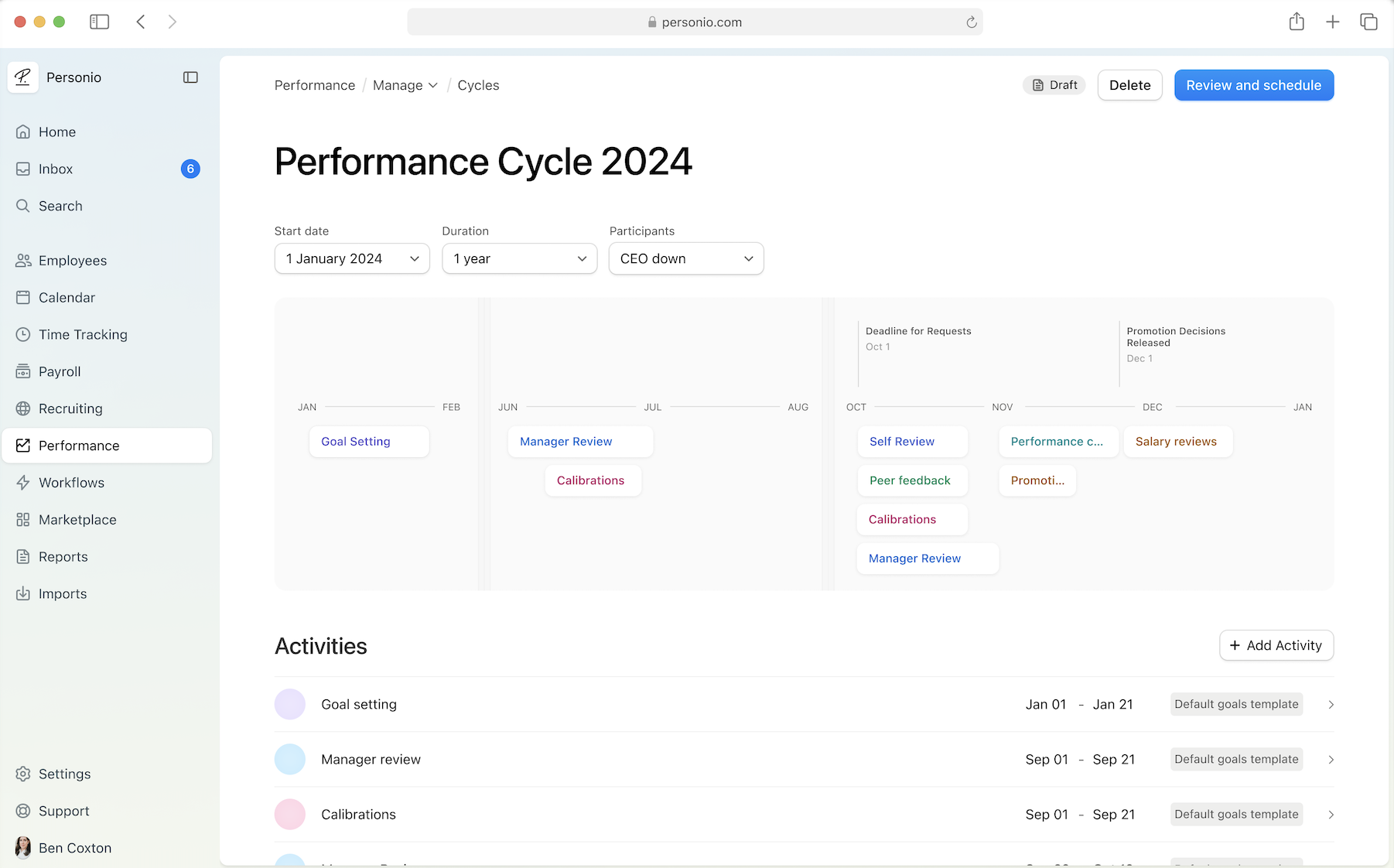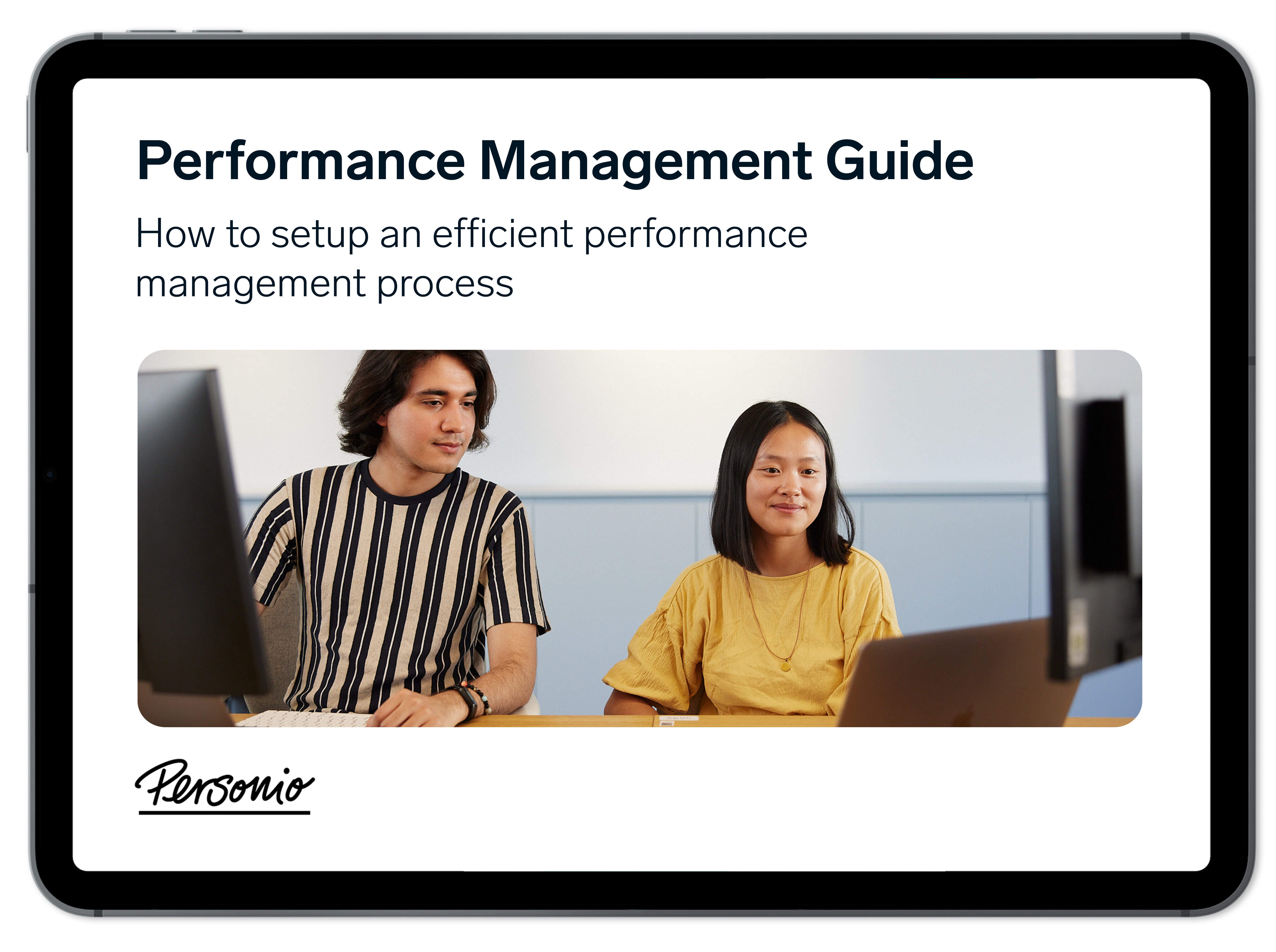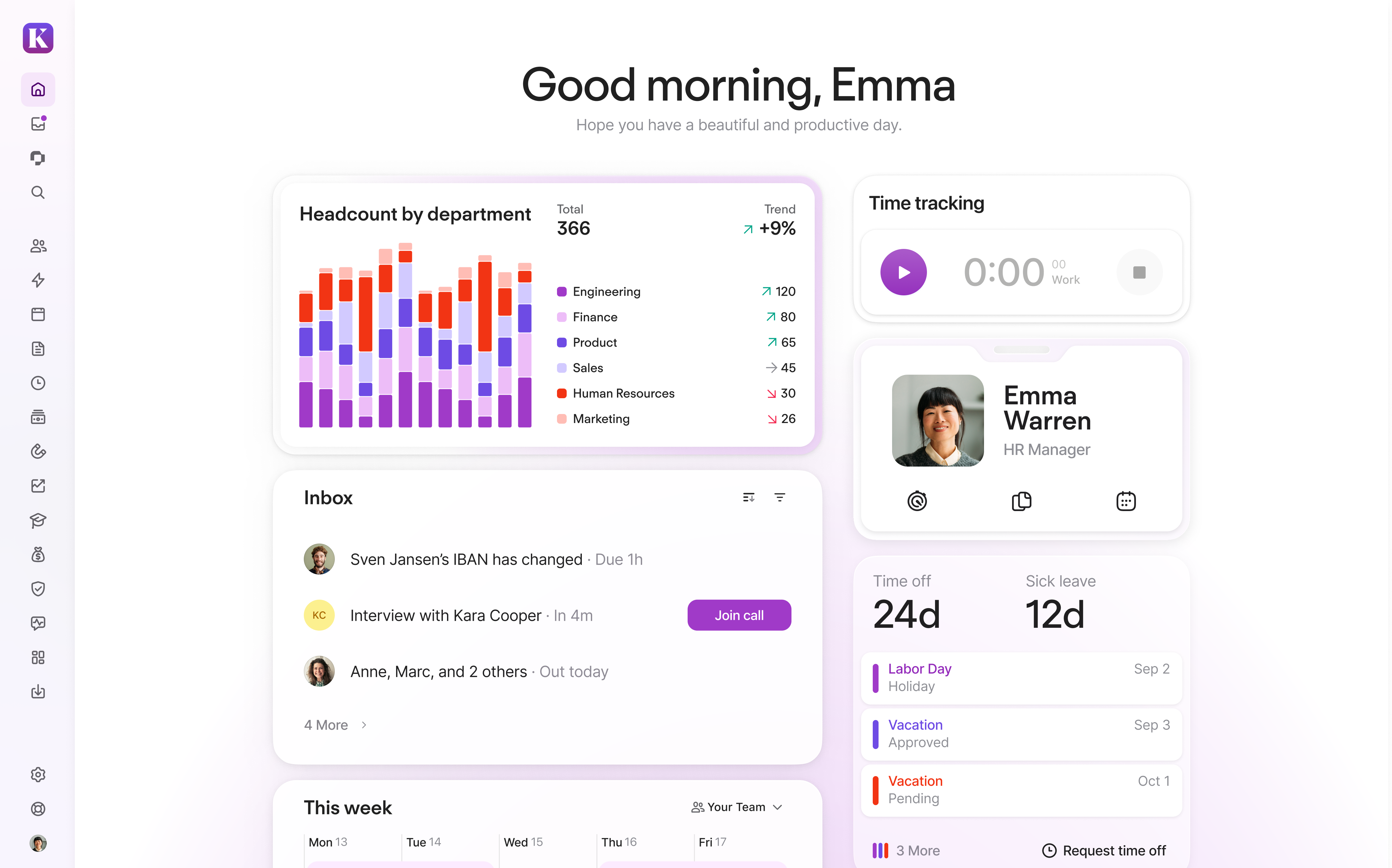
Centralise HR processes in a single platform
Create HR workflows and build better review cycles with Personio's intuitive performance management software
Find out moreStaff Appraisals Best Practices: Get the Most Out of Your Team

Whenever people hear the term “staff appraisals,” their minds likely go to their annual performance review. While the idea of an annual review can cause anxiety for many, it doesn’t always have to be this way!
When properly implemented, staff appraisals are an incredibly valuable tool for promoting the development of employees and boosting your overall talent management strategy. In this article, we profile all you need to know about them.
Make your next meeting amazing. Download our staff appraisal templates now.Contents
- 1What Is A Staff Appraisal?
- 2Are Appraisals At Work Important?
- 3What Should Be Discussed During An Appraisal?
- 4What Events Might ‘Trigger’ A Staff Appraisal?
- 5How Do You Execute A Staff Appraisal Meeting?
- 6What Are The Steps Of An Appraisal Meeting?
- 75 Appraisal Meeting Best Practices
- 8What Is The Key To A Great Staff Appraisal?
What Is A Staff Appraisal?
A staff appraisal is a management tool to help support employees in their professional development. Centered around an appraisal meeting, this is management’s chance to determine how an employee is faring, and what they might need to be better at their job in a more precise and actionable way.
Is An Appraisal The Same As A Performance Review?
In contrast to an annual evaluation or performance review, which only happens once a year (typically), a staff appraisal is a more frequent check-in with an employee to see where they are at in their work. Think of it as a meeting that maybe happens monthly or quarterly, depending on the employee’s role and responsibilities.
What Is The Point Of An Appraisal At Work?
The point of an appraisal in the workplace is to improve performance. It does this by creating regular interviews where employees are able to discuss their performance. Or, an appraisal can be triggered by an event (whether good or bad), like a project completion, to talk about how an employee has improved or can improve in their role.
Are Appraisal Meetings Legally Required?
Workplaces in the United Kingdom do not need to have staff appraisals by the letter of the law. That said, many organizations will use appraisals as a measure to help employees perform and to hold onto their top talent. So, while there may not be a legal framework, well-run organizations will simply have one in place.
Streamline your employee development

Define performance cycles, set goals, give effective feedback and evaluate performance fairly. Put structure on how you grow and retain staff with powerful performance management.
Boost your performanceAre Appraisals At Work Important?
Staff appraisals are important because they facilitate a key element of workplace success: feedback. The regular exchange of which helps build your company culture and ensures that you create a productive environment for everyone. Given that, ongoing and somewhat-informal exchanges are essential.
In addition, regular appraisals can also be baked into just about any performance management cycle. That way, you’re effectively building a system whereby an appraisal is a key part of making sure that employees are going down the right path. And, with the right HR software in place, you can even automate those cycles.
Building on that previous point, though, feedback can take a wide range of forms. It could be:
Meeting for a coffee and having a chat about a recent project.
A recap every time a project is finalized to discuss what went well (or not so well).
Messaging one another using your company’s internal communication tool.
What Should Be Discussed During An Appraisal?
A staff appraisal is about facilitating an exchange of ideas regarding expectations, plans, and goals (including, but not limited to, monetary goals). This is all in an effort to arrive at a common denominator.
Things like learning how things are going at the moment, some of the high-priority items on an employee’s to-do list, or the outlook for the months ahead. Each of these can help create common ground and understanding between employees and their managers.
Taken together, they are about promoting an employee’s personal and professional development, about motivating them through appreciation, and strengthening overall employee loyalty.
HR Best Practice: Build ‘Timeline Triggers’ For Your Staff Appraisals
A staff appraisal should happen, at the very least, on a quarterly basis between managers and employees. That said, it helps to create ‘triggers’ where an appraisal may also be appropriate (at the end of a project, after a training course, as part of an employee’s development plan).
Building these ‘timeline triggers’ will ensure that an appraisal isn’t just another box-ticking exercise for employees and managers, and can actually serve a greater purpose: giving employees the time to reflect on a moment in their careers that was impactful.
What Events Might ‘Trigger’ A Staff Appraisal?
Let’s start with a baseline distinction. There are essentially two types of ‘triggers’ for staff appraisal meetings, which include event-related and institutionalized appraisal meetings.
The first is as it sounds. A staff appraisal based on some kind of event that recently happened, which could include:
Particularly outstanding or poor performance
Conflicts
Necessary interventions in work processes, process changes
Failure to meet requirements
Optimization of work processes
Accidents at work
Prolonged or frequent employee illness
By contrast, institutionalized meetings are conducted regularly without a trigger beyond the passage of time. These serve to assess employees’ overall performance and are conducted in a standardized form that relies on set guidelines.
During these meetings, managers evaluate employee performance over a certain period of time and develop options to further an employee’s career. This could include a professional development plan, for instance.
The Key to Strategic Performance Management

Use our guide to set up your next great performance process. Find out how to strategically manage, motivate and retain employees in our practical guide.
Download NowHow Do You Execute A Staff Appraisal Meeting?
If we take a high-level overview, an appraisal meeting should be built on the following:
Assessing Past Performance | What has gone well and how did an employee feel about it. |
|---|---|
Providing Feedback | Where a manager weighs in on how they viewed the experience. |
Squaring Against Goals | Noting areas of improvement and how an employee has progressed. |
Inviting Feedback | Allowing employees to note where they feel they could use support. |
As an HR or People Team, it is incredibly important to promote transparency when it comes to an appraisal meeting. Your organization should make it very clear what is expected both of employees and of managers.
After all, an appraisal should be productive. An employee shouldn’t feel stressed ahead of it, and they should feel heard and supported after it. If your appraisals are causing more ill will than team spirit, you should absolutely revisit the process.
If any employee feels ‘prepared for’ and ‘part of a process,’ it can help increase their level of investment not only in their own goals but in the success of the company, as a whole.
What Are The Steps Of An Appraisal Meeting?
On a more technical level, let’s look into each stage of an appraisal meeting and what it should include:
Before An Appraisal | During An Appraisal | After An Appraisal |
|---|---|---|
Invite employees well ahead of time and let them know about the points you would like to discuss. | Encourage dialogue and allow the employee to share. | Reflect on how the meeting went. Are there any points where you could do better at the next appraisal meeting? |
Schedule sufficient time and book a suitable room where you won't be disturbed. | Define goals and contents to be discussed at the beginning of the meeting. | Create a record of the meeting that both the manager and employee acknowledge. |
Conduct employee appraisals in a timely manner and provide employees with a self-evaluation sheet. | Be attentive and listen, while documenting important points and key takeaways. | Support the employee in implementing their agreed-upon goals. |
Key Insight: Follow an appraisal meeting with realistic agreements. Employee goals and target agreements should always motivate employees rather than overwhelm them.
5 Appraisal Meeting Best Practices
Keep in mind these five key best practices to help run the best possible appraisal meeting with employees:
1. Schedule In Enough Time
Start by communicating with employees about their appraisal meetings well ahead of time, and make sure to schedule enough time to avoid having to conduct meetings under pressure. If necessary, you could even spread appraisals out over several weeks (an initial chat and a follow-up). This will ensure that employees feel like your team is committed to their development, and will also make it easier to record outcomes.
2. Always Over Prepare
Appraisals, by their very nature, are a bit more spontaneous than an annual performance review. That said, managers need to also have a big-picture approach to their employee’s development and how they have developed over the year (in the context of an appraisal’s ‘snapshot’ of performance). Log certain things, set reminders, and keep track of any events that may be relevant to the staff appraisal meeting throughout the year.
An HR software can help keep all of your employee data in one place. Learn more here.
3. Keep Feedback Specific & Actionable
An appraisal does not need to be a negative experience, even if an employee is struggling. That is why managers should be coached to focus on giving specific feedback based on facts and built on examples. Avoid generalizations and keep in mind that, in the best-case scenario, employees should be able to come up with a concrete plan for improving their work after your meeting.
4. Involve Employees In Goal Setting
Before an employee ever can reach their goals, they need to set them! If employees are not involved in this process, things can go wrong, very quickly. When done right, staff appraisals can avoid this entirely. In short, it is essential that employees and their managers engage as equal partners in the process. Otherwise, it is not possible for both sides to present their arguments and opinions.
5. Focus On Goals
The point of a staff appraisal is not to dwell on the past, at least not for long, but to project ahead to the future. This is where organizations need to show real leadership skills and work with employees to establish how goals can be achieved. If you apply excessive pressure in your position as a manager, you usually have more to lose than to gain.
What Is The Key To A Great Staff Appraisal?
A great staff appraisal happens when a manager is prepared, an employee feels supported and heard, and the organization maintains a presence over the entire process. Every person has an important role to play, and when each plays their part, appraisals can become a key part of a successful company culture driven by performance.
Click the button below to learn more about keeping track across all your performance cycles, and building ones that match your organization’s culture, values, and processes today, with Personio’s help.
